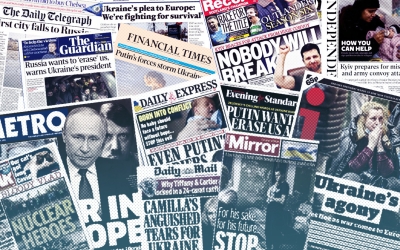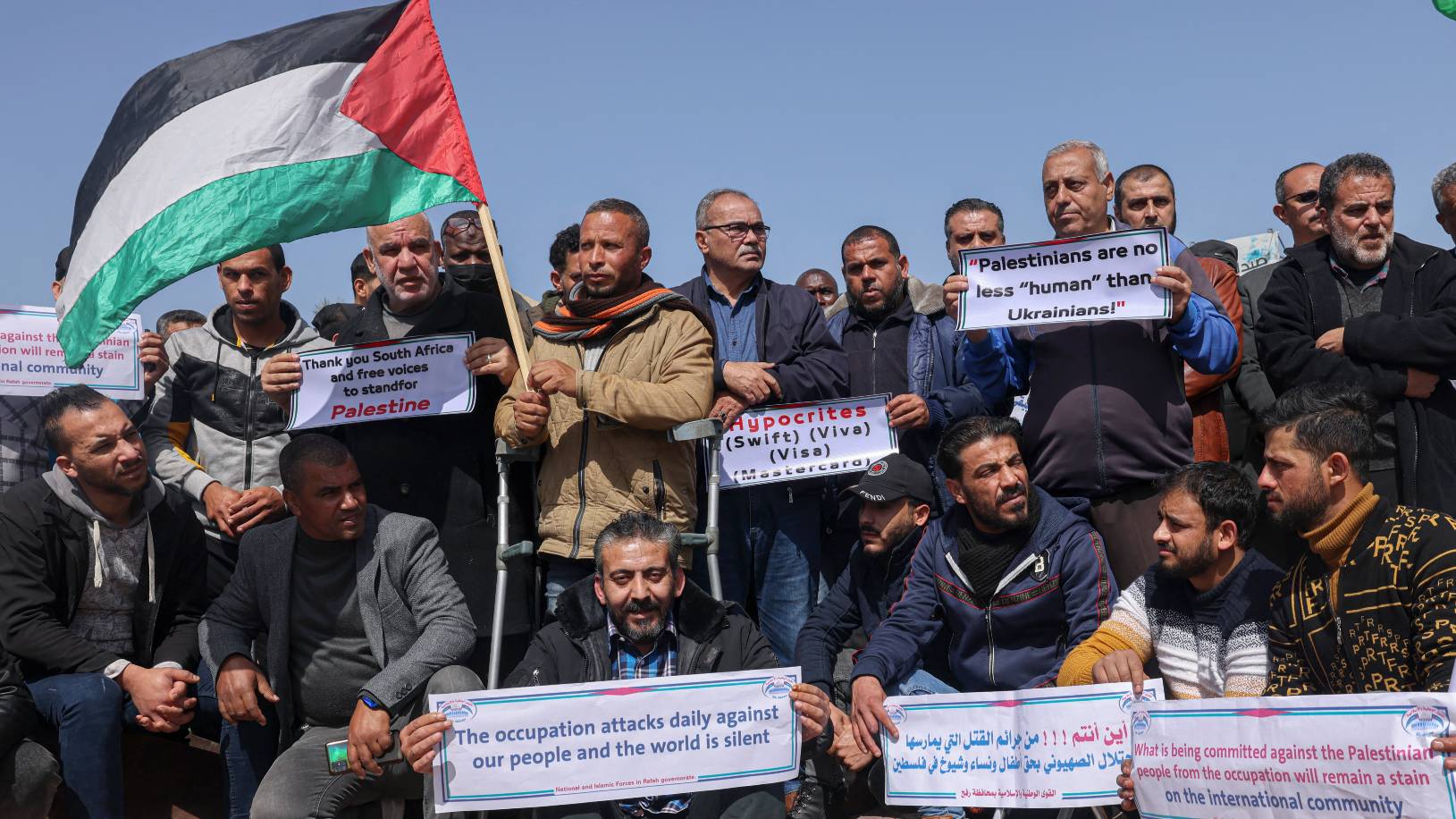How the Russia-Ukraine war exposed European hypocrisy over Palestine

Before Russia's invasion of Ukraine, I was asked during several conversations with European policymakers: "What can Europeans do to address the injustice in Palestine?" But when I suggested a list of desired interventions, I got in return fake smiles, rolled eyes, or suggestions that these were unrealistic demands.
For example, when I suggested that Europeans should support the Boycott, Divestment, Sanctions (BDS) movement, the answer was: "No, no, that belongs to another era." When I recommended a quick, unified European response to Israeli atrocities, I was told: "That does not exist; we are fragmented and very different, and the process of establishing a consensus is unfeasible." On resistance, it "is not a word we like to hear in our policy domains. That is inherently aggressive, and most likely violent."
Stay informed with MEE's newsletters
Sign up to get the latest alerts, insights and analysis, starting with Turkey Unpacked
How about solidarity, I asked? "Well, we prefer diplomacy. That is more modern and less activist." Liberation? "That is unattainable. What about self-governing?"
Read the text and think of Palestine. Read it again and think of Ukraine.
Welcome to European hypocrisy.
I often wonder, once the war in Ukraine is over, whether I will give the same list of demands, now that the bar is higher and we know better what Europe can do when there is a political will.
A moment of reflection
It is awful to compare tragedies, especially when civilian casualties and refugees are involved.
The 'Ukraine moment' offers Palestinians an opportunity to set the record straight where resistance, freedom, liberation and BDS are concerned
As a refugee myself, I know very well what that status entails. But the moments and processes of tragedies are also, sadly, moments of reflection and reassessment.
They are moments that expose complicit actors, reveal hypocrisies, and unmask realities. We have seen this for the past 100 years in Palestine, and also in the past two weeks in Ukraine.
It has been astonishing to witness the swift European response, the outpouring of statements condemning the Russian aggression, the unconditional welcoming of European refugees, the imposition of sanctions, the ability to mobilise quickly and collectively when the political will exists, the celebration of resistance when it is "white, blond and blue-eyed" - and the list goes on.
I am not envious of my Ukrainian fellows getting all the support they need. But I find myself compelled, in light of the "Ukraine moment" the world is going through, to ask my fellow Europeans, individuals and institutions: will you rethink your hypocritical attitudes and long-standing double standards?
Certainly, the world order needs shaking. Global governance institutions, including the UN Security Council, need a total revamp, and injustices should be addressed everywhere. But neither wars nor hypocrisy are the avenues to pursue in an effort to achieve this.
Addressing imbalances of power and reinventing global governance institutions are fundamental prerequisites to resolving long-standing conflicts and injustices - but without equality, accountability and sincerity, that will not be possible.
Strategic opportunity
Thus, the "Ukraine moment", with all the tragedies it entails and the precious lives lost, offers the international community - and Europeans in particular - an opportunity to reflect, and to start a process of inducing corrective measures to uphold European principles and values everywhere.
As European policymakers always remind us, every crisis brings an opportunity, and it is time to explore the opportunities that could be born of the Ukraine crisis. This might sound naive, insensitive, opportunistic or even offensive to Ukrainian citizens currently under attack, but it is critical to ensuring that justice, rights and freedom are for all, and not only for some.
Therefore, as painful as it might sound, the "Ukraine moment" offers Palestinians a strategic opportunity to set the record straight where resistance, refugees, freedom, liberation, political rights and BDS are concerned.
This is a strategic opportunity to hold European actors accountable not only for the past harm and grievances they have caused, but also for the present and future harms caused by denying Palestinians their rights.
Palestinians should escalate their BDS demands against apartheid, settler-colonial Israel, upholding the simple principle that Palestinians are entitled to the same rights as the rest of humanity. This is an effective way to ensure accountability, and it clearly has some traction in European policy circles.
Narrative of resistance
At the same time, Palestinians should intensify their actions to uphold international law and pursue accountability via the International Criminal Court.
Palestinians should remind the world every day that the forcible transfer of the Palestinian population, and the introduction of nationals of the occupying power, are in grave violation of international humanitarian law and constitute a war crime.
Going forward, it will not be acceptable for European policymakers to tell me, when I ask them to treat Palestine like Ukraine: 'It's different!'
Palestinians should not shy away from the narrative and practice of resistance, and should push against its criminalisation - not only because it is an effective way to change power dynamics and attain rights, but also because resistance is justified and necessary in the face of military occupation and oppression.
The intention here is not to build on or instrumentalise the pain of others to realise our own political gains. But if we want to build a different world order, we must address the basics first.
Europe, we now know what you can do when you want to. And we know better how to hold you accountable. For now, let's keep the focus on the "Ukraine moment". Tomorrow, let's use it to redress other injustices around the world.
Going forward, it will not be acceptable for European policymakers to tell me, when I ask them to treat Palestine like Ukraine: "It's different!"
Middle East Eye delivers independent and unrivalled coverage and analysis of the Middle East, North Africa and beyond. To learn more about republishing this content and the associated fees, please fill out this form. More about MEE can be found here.







